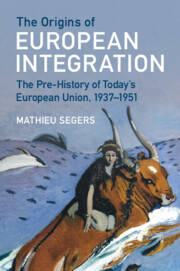Book contents
- The Origins of European Integration
- The Origins of European Integration
- Copyright page
- Contents
- Acknowledgements
- Abbreviations
- Prologue
- Introduction
- Part 1 Beyond Americanisation (1937–1947)
- Part 2 The Making of European Integration (1947–1951)
- 5 The Marshall Plan: Western Europe as a Unit
- 6 British Preoccupations and Ecumenical Politics
- 7 Reality Check: The OEEC and ‘Integration’
- Conclusion
- Bibliography
- Index
7 - Reality Check: The OEEC and ‘Integration’
from Part 2 - The Making of European Integration (1947–1951)
Published online by Cambridge University Press: 13 December 2023
- The Origins of European Integration
- The Origins of European Integration
- Copyright page
- Contents
- Acknowledgements
- Abbreviations
- Prologue
- Introduction
- Part 1 Beyond Americanisation (1937–1947)
- Part 2 The Making of European Integration (1947–1951)
- 5 The Marshall Plan: Western Europe as a Unit
- 6 British Preoccupations and Ecumenical Politics
- 7 Reality Check: The OEEC and ‘Integration’
- Conclusion
- Bibliography
- Index
Summary
This chapter is the third and final building bloc of a wider reconstruction of the main economic, (geo)political, and ideational forces that enabled European integration to take off as of the spring of 1950, It describes the practical unfolding of European integration after the Second World War. This part of the book tries to uncover deeper layers (of psychology and belief) in this history through three crucial sub-histories. This chapter deals with the third of these sub-histories. It explains how—against the background of the beginnings of the Cold War and growing British aloofness in European affairs— ‘the (West) German re-entry’ became the driving force in the process of emerging European integration. This development crystallised first in the OEEC, subsequently through the EPU, and finally in the launch of the ECSC. This process was not only political and economic in nature, but also to a great extent intellectual via the deep influence of (German) ordoliberalism in the politics of the FRG and Christian Democracy in Western Europe.
Keywords
- Type
- Chapter
- Information
- The Origins of European IntegrationThe Pre-History of Today's European Union, 1937–1951, pp. 168 - 196Publisher: Cambridge University PressPrint publication year: 2023

